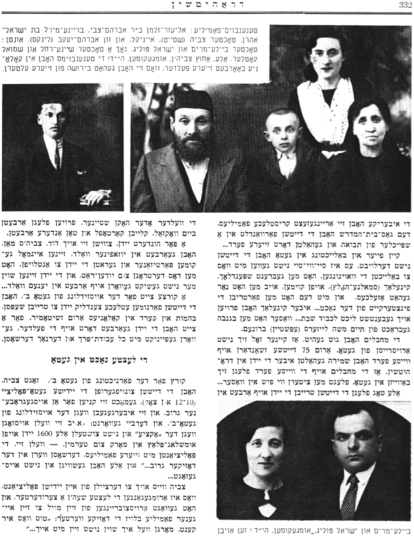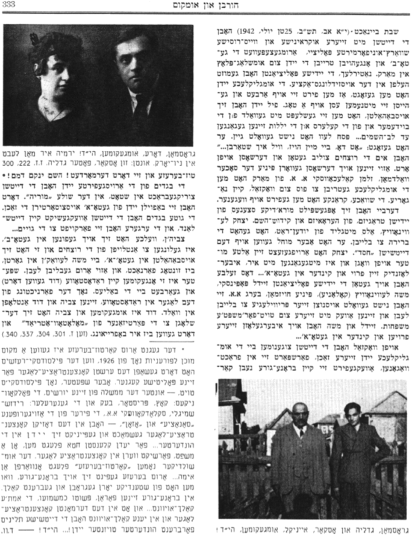
[Page 332]
[photo:] Tennenbaum family: Eliezer-Zalman son of Avraham Zvi, Breina Mirel daughter of Yisrael Aharon, daughter Zvia (standing), grandchild, and son Avraham Yaakov, left. Below: daughter Beila Miriam and Yisrael Polig. There was another daughter, Sheina-Rachel and Shmuel Kotler. All perished except for Zvia. The Tennenbaums cultivated their fields in Kolonia that they had inherited from their parents.
The Street House of Study was turned into a granary and a horse stable. The Germans prohibited any illumination or fire in the ghetto. In any event, there was nothing to use to illuminate the houses. People burned wood chips and resin wood on the chimneys, if such fuel was available. This kept people from living in total darkness at night. Women also used the resin wood for Sabbath candles, while water was obtained secretly from Chaim Moshe Lazer's (Epstein) well.
The terrorists made sure that no one sneaked out of ghetto. There were approximately 75 German police on white horses guarding the Jews of Drohitchin. If these guards ever showed up inside the ghetto, people would tremble like fish out of water. The Germans would round up the Jews for work in the forests or for chopping wood. Women would work in the train station, collect potatoes and perform other jobs.
A couple of hundred Jews, including Zvia's husband David, worked in the Yozafin Forest. Once partisans came along and advised the Jews to escape. This information got to the Judenrat, and Jews were no longer allowed to work in that forest. According to Zvia, a short time after Ghetto B was cursed out, the Germans called the Jewish ghetto police (10-12 men) told them to kneel in front of a mass grave, and warned them that in regard to Ghetto B, if they said anything about the aktsia and did not round up all 1,600 Jews at the transport location in the market, the Germans would kill all of the police and their families by shooting them at the same ditch. Everyone remained silent and did not say a word about the plans.
Zvia also told a story about a Jewish policeman who was going around very agitated in the final hours. He dared let slip from his mouth to his own family that they should do what they could, since the next day he would not be with them any longer.
[photo:] Beila-Miriam and Yisrael Polig. They perished. May G-d avenge their blood! See above.

[Page 333]
One Saturday night (July 25, 1942) the Germans and their Ukrainian and White Russian collaborators surrounded Ghetto B, and started to round up the Jews at the transport location in the market. Of course, the Jewish police had to assist in the accursed aktsia. The hapless Jews were told that they were being taken to work, and that they should take food for the day with them. Many Jews went into hiding, and they were forcibly dragged out of the attics and cellars. The cries rose to heaven. Pesach Lev did not want to go. He said that he wanted to die in his own house. The murderers shot him on the spot. Pinya Waldman of Socha, Zalman Kalekhovsky and others from the market were shot; the hapless Jews were taken by foot to the train station in Nagoria. The weak and ill were taken by wagon.
At that time, frightful scenes of Jewish tragedy and sacrifice for the Name of G-d were played out. As a member of the Judenrat, Yitzchak Levinovitz had the choice to remain. However, he passed up this German “mercy”, put his elderly mother in the wagon and accompanied her. He left behind his wife and children in Ghetto A. This was replicated by the Jewish policemen Zeidel Popinsky, Moshe Levinovitz (Kolonia), Pinya Khoyzman, Berg and others. They did not want to benefit from their privilege to remain alive, and went together with their families who had received the death sentence. Zeidel and Moshe also left behind their wives and children in Ghetto A.
At the station, the Germans confiscated the Jews' possessions, put them into freight cars, and took them away to Brona-Gora, near Kartuz-Bereza, and murdered them! May G-d avenge their blood!* The Germans took the clothes of the expelled Jews back to town to the Moriah School. They then ordered Jews from Ghetto A to sort them out; the good clothes were sent off to Germany, and the poor quality clothes were sold to the local gentiles.
Zvia, who was in Ghetto B, succeeded in escaping from the murderers and hid out in Ghetto A in the garden of Moshe Levack until Sunday night. This is how she stayed alive. Later on she got to Radostov (David was there), and washed clothes in washtubs. After the destruction of the camp in Radostov, Zvia and David escaped into the forest. David perished and Zvia got to the partisans of the Molotov Unit. She remained there until the liberation. (See pp. 301, 304, 337, 340).
[Photo:] Gedaliah Grossman and his grandson Oscar. They perished. May G-d avenge their blood!
[Photo:] Dora Grossman perished. May G-d avenge her blood! Her husband Yirmiyahu lives in New York. Below: Son Oscar and father Gedaliah. See pp. 222, 300.
Previous Page |
Next Page
JewishGen, Inc. makes no representations regarding the accuracy of
the translation. The reader may wish to refer to the original material
for verification.
JewishGen is not responsible for inaccuracies or omissions in the original work and cannot rewrite or edit the text to correct inaccuracies and/or omissions.
Our mission is to produce a translation of the original work and we cannot verify the accuracy of statements or alter facts cited.
 Drogichin, Belarus
Drogichin, Belarus
 Yizkor Book Project
Yizkor Book Project
 JewishGen Home Page
JewishGen Home Page
Copyright © 1999-2026 by JewishGen, Inc.
Updated 3 Dec 2001 by LA